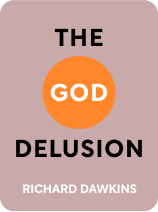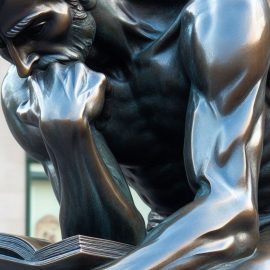

This article is an excerpt from the Shortform book guide to "The God Delusion" by Richard Dawkins. Shortform has the world's best summaries and analyses of books you should be reading.
Like this article? Sign up for a free trial here .
Why do people believe in religion? What does it really mean to believe in religion, and where did religion com from?
Religion is a huge part of life all around the world. But, why do people believe in religion? Author Richard Dawkins argues that believing in religion is backward, and society should progress without it.
Keep reading to find out the answer to the question, “why do people believe in religion?”
Why Do People Believe in Religion?
Religion has been central to nearly every human society in history. It is difficult for many people to imagine a world without a supreme deity.
But what if faith in God represents a great error? What would be the possibilities for human advancement if we were to shed our religious faith and embrace reason and science as the ultimate arbiters of truth and justice?
In The God Delusion, University of Oxford biologist and anti-religion activist Richard Dawkins argues that religion has exerted a harmful influence on human society since its inception and that we ought to abandon it in favor of science.
- The unwarranted favor and deference granted to religion
- The unlikelihood of God’s existence and the weakness of the arguments in favor of it
- How religion is nothing more than a by-product of other, unrelated evolutionary mechanisms
- Why we don’t owe our morality to religion
- How religion promotes values that are distinctly immoral
- How humankind would benefit from the ultimate destruction of religion and a positive embrace of atheism.
So why do people believe in religion? Let’s dive in.
The Theist Position: Why Do People Believe in Religion?
Before we discuss the reasons why religion is harmful and should be abandoned, we first need to explore two topics. First, we’ll discuss what the claims of theists (and atheists) actually are. This is an important part of the question “why do people believe in religion?” Then, we’ll discuss why it’s appropriate to evaluate and challenge the claims of religion. Religious people often claim that their faith is under unique threat of persecution. Therefore, in their eyes, any criticism, mockery, or even the mere expression of skepticism regarding anyone’s religious beliefs constitutes an act of bigotry.
- Why claims of an intelligent creator deserve to be evaluated on their merits, and not merely accepted as inherently unknowable
- How religion commands an undeserved level of respect and reverence, even from non-believers
- How any harmful or discriminatory action can be accepted—as long as it is justified on the grounds that it is part of one’s religious beliefs
The Claims of Theism
Prior to delving deeper into our discussion of God and religion, we should clarify some terms. When we say “religion,” we are referring to the belief in a supernatural being who created the universe and who has the power to intervene in human affairs.
This supernatural being—we will refer to it as “God” from here on, for simplicity’s sake—can be prayed to, petitioned, and even called upon to punish one’s enemies. This form of religion, which postulates the existence of an intelligent and omnipotent creator, is known as theism.
The particular form of theism we’ll be discussing in this summary is monotheism, the belief in one supreme God. While polytheism (a belief in multiple gods) does exist, the vast majority of people in the West are far more familiar with the three major monotheistic or Abrahamic religions—Judaism, Christianity, and Islam.
Deism and Pantheism
So why do people believe in religion in modern times? Defenders of traditional religion often like to make the claim that celebrated historical figures in philosophy, politics, and science were committed monotheists. However, these claims are nearly always exaggerated, if not outright false.
For example, many of the American Founding Fathers, including Thomas Jefferson, James Madison, and Benjamin Franklin, were not monotheists at all. Rather, they were deists, believing that, while God did indeed create the universe, he played no role in the management or governance of its day-to-day affairs. These men were deeply anti-clerical in their writings and railed against the ignorance, superstition, and prejudice that they viewed as the natural byproducts of religion.
And while some scientific luminaries like Charles Darwin, Stephen Hawking, and Albert Einstein used the word “God” in their writings (which have been subsequently cherry-picked and decontextualized by religious writers to provide “proof” that these figures were religious), they were almost certainly not using it in the monotheistic sense, but rather, pantheistically: as a metaphor for the totality of the universe.
Defining Atheism
Now that we have an understanding of monotheism, we have to define its opposite number—atheism. An atheist is someone who assigns an extremely low probability to God’s existence and lives their life on the assumption that he does not exist.
Atheists reject the idea of an intelligent creator on the grounds that the only process that can produce beings capable of such conscious creation is evolution by natural selection (which we’ll explore in greater detail later in the summary).

———End of Preview———
Like what you just read? Read the rest of the world's best book summary and analysis of Richard Dawkins's "The God Delusion" at Shortform .
Here's what you'll find in our full The God Delusion summary :
- Why Dawkins thinks religion has exerted a harmful influence on human society
- How Dawkins concludes that the existence of God is unlikely
- The 3 arguments that challenge the existence of God






